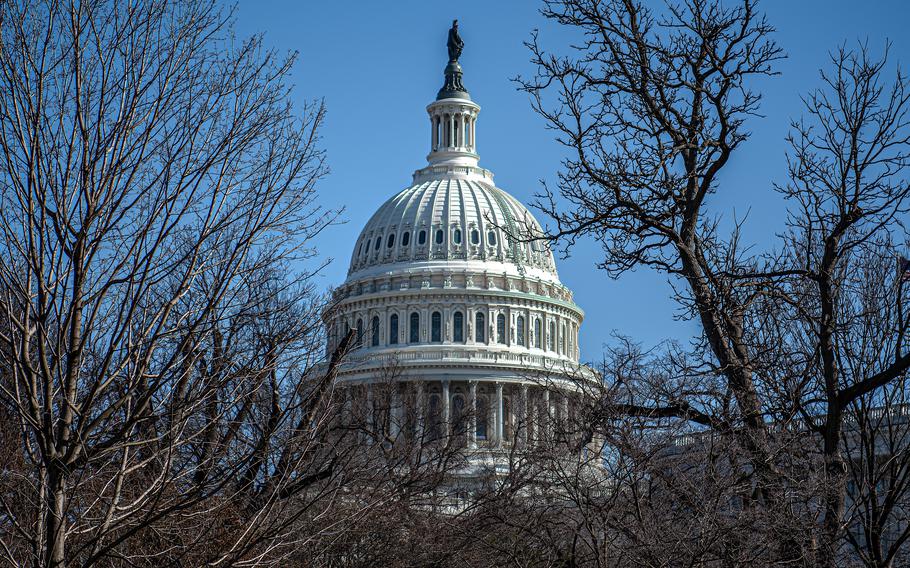
The U.S. Capitol building in Washington. (Stars and Stripes)
WASHINGTON — The Senate on Friday forged ahead with plans to give the military an additional $150 billion in spending even as the Pentagon seeks to make sweeping changes and reductions in its budget.
Senators voted 52-48 in favor of a budget resolution that will unlock $340 billion in spending for U.S.-Mexico border security, energy independence, Coast Guard modernization and military investments while mandating cuts elsewhere.
Sen. Lindsey Graham, R-S.C., the chairman of the Senate Budget Committee, said the framework will reinforce the defense industrial base and allow the military to become “more lethal.”
How the money will be spent will be outlined by the Senate Armed Services Committee but Graham said he wants to see a larger Navy, integrated air and missile defense and a strengthening of the nuclear defense posture.
“There’s a lot of modernization we need of our nuclear triad fleet,” Graham said. “We need more weapons, our stockpile is low. There’s a bunch of things we can spend $150 billion on but we’ll let the Armed Services Committee decide those priorities.”
Another $20 billion is being earmarked for the Coast Guard to enhance its capability to deal with “drugs and national security threats,” he said.
The budget resolution adopted Friday is the first step of a long process called reconciliation that Republicans hope to use to pass President Donald Trump’s economic agenda without the legislation being subject to a 60-vote threshold in the Senate. The House has its own version of a budget resolution that also calls for $150 billion in defense spending in the next decade.
Trump has thrown his support behind the House’s version of the resolution, which would wrap border security and defense spending as well as $4.5 trillion in tax cuts into one spending package. The Senate plans to address the tax cuts in a separate bill.
Senate Republicans said the situation at the southern border was so dire and the military so depleted “after four years of weakness” under former President Joe Biden that the Senate had to act quickly in case the House falters. Republicans control the House by a slim margin.
“We live in a dangerous world, the threats against the United States are higher than we have seen in decades,” said Sen. John Barrasso, R-Wy. “Weakness invites conflict, strength deters war. This budget is a big step toward rebuilding our military, to protecting our nation.”
The move by the Senate to shore up defense spending comes amid a push by Defense Secretary Pete Hegseth to pull 8%, or about $50 billion, from the Pentagon budget. Hegseth reportedly ordered senior leaders in a memo this week to develop plans to cut that amount in each of the next five years.
But Hegseth denied those reports in a video posted late Thursday and said he is looking for a shift this year of $50 billion from “woke, Biden-era, non-lethal programs” to “President Trump’s ‘America First’, ‘peace through strength’ priorities.” Those priorities include southern border operations and an array of weapons programs.
“That’s not a cut,” Hegseth said. “It’s refocusing and reinvesting existing funds into building the force that protects you, the American people.”
The Pentagon’s budget for 2025 is about $850 billion. The memo outlining the spending changes Hegseth is proposing has not been publicly released.
Sen. Roger Wicker of Mississippi, the Republican chairman of the Senate Armed Services Committee, has expressed support for Hegseth’s memo and said Trump is committed to a “desperately needed military rebuild” that will require “significant real growth in the defense topline.”
Wicker on Friday praised the passage of the Senate’s budget blueprint as a pathway for “much needed investments in defense.”
The resolution passed despite unanimous opposition from Democrats, who argue the resolution paves the way for massive tax cuts that will largely benefit the wealthy and require cuts in the social safety net.
Sen. Tim Kaine, D-Va., said this week that Democrats have repeatedly voted for additional defense spending and there was no need to tack on more through a reconciliation process that will sideline Democrats.
“We spent $850 billion and we added to it twice with a bipartisan vote,” he said. “You don’t need reconciliation for that.”